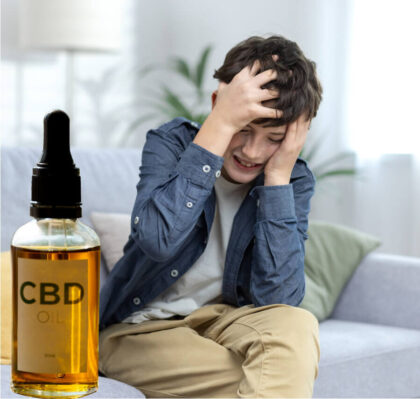The complicated neurodevelopmental illness known as autism spectrum disorder (ASD) has an impact on behavior, social interaction, and communication.
There is no cure for autism, but there are various treatments and therapies that can help improve the quality of life of people with ASD and their families.
One of the emerging options that has gained popularity in recent years is CBD oil, a natural compound derived from cannabis that may have various health benefits.
But what is CBD oil, how does it work, and is it safe and effective for autism?
Three types of CBD oil:
Depending on the amount and type of cannabinoids they contain:
Full-spectrum CBD oil contains all the components of the cannabis plant, including trace amounts of THC (less than 0.3% in the US).
Broad-spectrum CBD oil contains all the components of the cannabis plant, except THC.
CBD isolate is pure CBD, with no other components of the cannabis plant.
CBD oil is legal in the US if it is derived from industrial hemp or imported from Europe, but the laws may vary from state to state and country to country.
Therefore, it is important to check the local regulations before buying or using CBD oil.
How does CBD oil work for autism?
The exact mechanism of how CBD oil works for autism is not fully understood, but it may involve the interaction with the endocannabinoid system (ECS), a network of receptors and molecules that regulate various physiological and cognitive processes, such as mood, pain, inflammation, memory, and immune response.
The ECS is also involved in the development and function of the nervous system, and some studies have suggested that people with ASD may have alterations or dysfunctions in the ECS.
CBD may also affect other receptors and neurotransmitters in the brain, such as serotonin, dopamine, and glutamate, which are involved in mood, motivation, and learning.
CBD may have various therapeutic effects, such as:
Reducing anxiety and stress, which are common in people with ASD and can affect their social and emotional functioning.
Alleviating symptoms of depression, which can also co-occur with ASD and affect the well-being and quality of life of people with ASD and their families.
Improving sleep quality and duration, which are often disrupted in people with ASD and can affect their health and behavior.
Decreasing aggression and self-injurious behaviors, which can be challenging and dangerous for people with ASD and their caregivers.
Enhancing social skills and communication, which are core impairments in ASD and can affect the ability to form and maintain relationships.
Preventing or reducing seizures, which can affect up to 30% of people with ASD and can worsen their cognitive and behavioral outcomes.
Is CBD oil safe and effective for autism?
The safety and efficacy of CBD oil for autism are still under investigation, and there is not enough scientific evidence to support its use as a treatment for ASD.
However, there are some preliminary studies and anecdotal reports that suggest that CBD oil may be beneficial for some people with ASD.
For example, a 2019 study from Israel evaluated the effects of CBD oil on 188 children and adolescents with ASD over six months.
The results showed that CBD oil improved the behavior, anxiety, and communication of 61.8% of the participants, and the most common side effects were sleepiness, lack of appetite, and reflux.
Another 2019 study from Brazil assessed the effects of CBD oil on 15 children and adolescents with ASD over 18 weeks.
The results showed that CBD oil reduced the severity of ASD symptoms, improved social interaction and communication, and increased cognitive performance and quality of life.
The most common side effects were increased appetite, sedation, and fatigue.
These studies are promising, but they have some limitations, such as small sample size, lack of control group, and subjective measures.
Therefore, more rigorous and large-scale clinical trials are needed to confirm the safety and efficacy of CBD oil for autism, and to determine the optimal dosage, formulation, and administration method.
What are the Risks and Challenges of using CBD oil for autism?
CBD oil is generally considered to be safe and well-tolerated, but it is not without risks and challenges.
Some of the potential issues that parents and caregivers should be aware of before using CBD oil for autism are:
Drug interactions:
CBD oil may interact with some medications, such as anticonvulsants, antidepressants, and antipsychotics, and affect their metabolism and efficacy.
Therefore, it is important to consult a doctor before using CBD oil and monitor the blood levels of the medications.
Side effects:
CBD oil may cause some mild to moderate side effects, such as drowsiness, dry mouth, diarrhea, nausea, fatigue, and changes in appetite and weight.
These side effects may vary depending on the dose, formulation, and individual sensitivity of the user.
Quality and purity:
CBD oil is not regulated by the FDA, and there is no guarantee that the products on the market are safe, pure, and consistent.
Some CBD oil products may contain contaminants, such as pesticides, heavy metals, or solvents, or have inaccurate or misleading labels, such as higher or lower amounts of CBD or THC than claimed.
Therefore, it is important to buy CBD oil from reputable sources, and look for third-party lab tests and certificates of analysis that verify the quality and purity of the products.
Legal status:
CBD oil is legal in the US if it is derived from industrial hemp or imported from Europe, but the laws may vary from state to state and country to country.
Some states may require a prescription, a medical marijuana card, or a special registration to use CBD oil, while others may prohibit or restrict its use.
Therefore, it is important to check the local regulations before buying or using CBD oil, and avoid traveling with CBD oil across state or national borders.
Social stigma:
CBD oil is derived from cannabis, which is still associated with negative stereotypes and stigma in some cultures and communities.
Some people may not understand the difference between CBD and THC, or the potential benefits of CBD oil for autism.
Therefore, parents and caregivers may face social pressure, judgment, or discrimination when using CBD oil for their children with ASD.
How to use CBD oil for autism?
There is no standard or universal guideline on how to use CBD oil for autism, as the optimal dose, formulation, and administration method may depend on various factors, such as the age, weight, and severity of the symptoms of the user, the type and quality of the CBD oil product, and the individual response and tolerance of the user.
However, here are some general tips and recommendations that may help parents and caregivers who want to try CBD oil for their children with ASD:
Consult a doctor:
Before using CBD oil for autism, it is essential to consult a doctor who is knowledgeable and experienced in cannabis medicine, and who can evaluate the medical history, current condition, and medications of the child, and provide guidance and monitoring throughout the process.
Start low and go slow:
A common principle for using CBD oil is to start with a low dose and increase it gradually until the desired effects are achieved or the side effects become intolerable.
The initial dose may vary depending on the weight and severity of the symptoms of the child, but a general range is 0.5 to 2 mg of CBD per kg of body weight per day.
The dose can be divided into two or three administrations per day, and adjusted every week or two based on the response and tolerance of the child.
Choose the right product:
There are many types and brands of CBD oil products on the market, and choosing the right one can be challenging and confusing.
Some of the factors to consider are:
The potency of CBD oil:
The potency of CBD oil refers to the amount of CBD per unit of volume, usually expressed in milligrams per milliliter (mg/mL).
The higher the potency, the stronger the effects of CBD oil, but also the higher the risk of side effects and drug interactions.
Therefore, parents and caregivers should choose a potency that matches their child’s needs and tolerance, and adjust it accordingly.
A common range of potency for CBD oil is 10 to 80 mg/mL, but some products may have higher or lower potencies.
The flavor of CBD oil:
CBD oil has a natural earthy and grassy taste, which some people may find unpleasant or bitter.
To mask the taste, some CBD oil products may have added flavors, such as mint, vanilla, or fruit.
However, some flavors may also have artificial ingredients, sweeteners, or allergens, which may not be suitable for some children.
Therefore, parents and caregivers should check the label for the ingredients of the flavor, and choose a flavor that their child likes and can tolerate.
Alternatively, they can mix the CBD oil with food or drinks, such as yogurt, smoothies, or tea, to make it more palatable.
The delivery method of CBD oil:
CBD oil can be consumed in various ways, each with its own advantages and disadvantages.
Some of the common delivery methods are:
Sublingual.
This involves placing a few drops of CBD oil under the tongue and holding it for 60 to 90 seconds before swallowing.
This allows the CBD to be absorbed directly into the bloodstream through the mucous membranes, bypassing the digestive system and the liver.
This method is fast-acting, discreet, and easy to use, but it may also cause irritation or dryness in the mouth.
Oral.
This involves swallowing CBD oil capsules, gummies, or edibles, or adding CBD oil to food or drinks.
This allows the CBD to be digested and metabolized by the liver, which may prolong and enhance its effects.
This method is convenient, tasty, and familiar, but it may also have lower bioavailability, meaning that less CBD reaches the bloodstream.
It may also take longer to feel the effects, and the effects may vary depending on the food or drink.
Topical.
This involves applying CBD oil creams, balms, or salves to the skin, where it can penetrate the surface and interact with the local receptors and inflammation.
This method is ideal for targeting specific areas of pain, inflammation, or skin conditions, such as eczema or psoriasis.
This method is simple, safe, and effective, but it may also have lower absorption, meaning that less CBD reaches the deeper tissues and the bloodstream.
It may also cause skin irritation or allergic reactions in some people.
Inhalation.
This involves inhaling CBD oil vapors or smoke through a vaporizer, a vape pen, or a pre-rolled CBD joint.
This allows the CBD to be absorbed rapidly into the lungs and the bloodstream, producing immediate and potent effects.
This method is discreet, portable, and customizable, but it may also have higher health risks, such as lung damage, respiratory infections, or addiction.
It may also be illegal or restricted in some areas, and it may not be suitable or acceptable for children.
Therefore, parents and caregivers should choose a delivery method that suits their child’s preferences, needs, and lifestyle, and weigh the pros and cons of each method.
Conclusion
CBD oil is not a cure for autism, and it is not a substitute for other treatments and therapies.
CBD oil is still under research, and there is not enough scientific evidence to support its safety and efficacy for autism.
CBD oil may also have some risks and challenges, such as drug interactions, side effects, quality and purity issues, legal status, and social stigma.
Therefore, parents and caregivers who want to use CBD oil for their children with ASD should consult a doctor, start low and go slow, choose the right product, and monitor the results and reactions of their children.
FAQs
Is CBD oil a viable option for managing symptoms of autism in children?
While research is ongoing, some studies suggest that CBD oil may help alleviate certain symptoms associated with autism, such as anxiety and sleep disturbances.
However, it’s crucial to consult with a healthcare professional before incorporating CBD into a child’s treatment plan.
Are there any potential side effects or risks of using CBD oil for children with autism?
Like any supplement, CBD oil may have side effects, including changes in appetite, fatigue, or interactions with other medications.
It’s essential for parents to consult with a healthcare provider to determine the safety and appropriateness of CBD for their child.
How should parents determine the right dosage of CBD oil for their child with autism?
Dosage recommendations for CBD can vary based on factors such as a child’s weight, age, and individual response.
It is crucial to start with a low dose and gradually increase under the guidance of a healthcare professional to monitor its effects on the child’s symptoms.
Can CBD oil be used as a standalone treatment for autism, or should it be combined with other therapies?
CBD oil should not be considered a sole treatment for autism. It is often more effective when used as part of a comprehensive treatment plan that includes behavioral therapies, educational interventions, and other recommended treatments.
Collaboration with healthcare providers is essential for a holistic approach.
What does current research say about the effectiveness of CBD oil for autism spectrum disorder (ASD)?
While some studies suggest that CBD may have potential benefits for individuals with ASD, more research is needed to establish its efficacy and safety definitively.
Parents should stay informed about the latest research findings and consult with healthcare professionals to make informed decisions about their child’s care.




